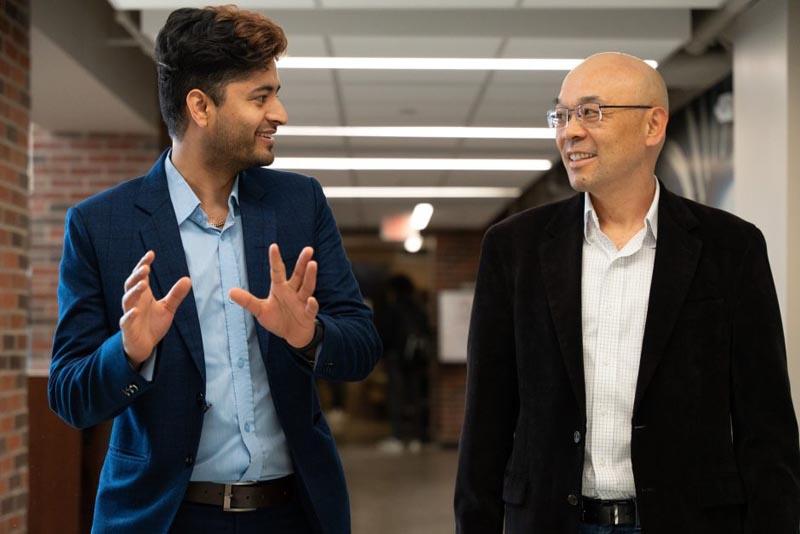February 11, 2024
By Erin O’Connell

Photo by Cj Harris
Jianlin “Jack” Cheng, a Curators’ Distinguished Professor in the University of Missouri College of Engineering, is an expert in electrical engineering and computer science. At Mizzou, he’s passing on his knowledge and preparing the next generation to solve some of society’s most pressing issues through use of advanced technologies such as artificial intelligence (AI).
“Technology gives us opportunities we’ve never had before,” Cheng said. “We can tackle major challenges in medicine, food, energy, and the environment, speed up the research process and find solutions more efficiently. My students are able to use these opportunities to take us to places we have never been before.”
Ashwin Dhakal is one of the students studying under Cheng. Dhakal, a graduate student from Nepal, was exploring options for a doctoral program that focused on AI and machine learning when he first connected with Cheng.
“I had just finished my undergraduate degree in Nepal, and after Dr. Cheng and I exchanged a couple of emails, he offered me a graduate research assistant position for my doctorate in computer science,” Dhakal said. “Dr. Cheng is a renowned expert in the field, and it was an honor to accept the position and come to Mizzou.”
Currently, Dhakal is working with Cheng to conduct research on how to apply AI for drug design and protein structure modeling.
“AI is the future,” Dhakal said. “We still have a lot of things to discover about it, and I encourage my peers to pursue studies using AI and bioinformatics with Dr. Cheng. Together, we can truly change the world.”
Cheng loves working with and providing guidance for his students, and said that, a lot of the time, he finds himself learning from them as well. Each student works in their own area and develops new research and tools under Cheng’s leadership.
“Mizzou has given me the opportunity to work with really talented students,” Cheng said. “I get to advise them, guide them through research, watch them publish papers and create tools or even become scientists. It’s so rewarding.”
Every two years, Cheng’s students test their findings at the Critical Assessment for Protein Structure Prediction (CASP) competition. The worldwide experiment provides research groups with an opportunity to test their methods. More than 100 research groups may participate in every competition.
“My students and I have ranked in the top teams in the world,” Cheng said. “That gave us enormous excitement and confidence in what we can achieve. It just goes to show that we do world-class research at MU.”
Going forward, Cheng said he has no plans of stopping.
“In the future, I want to continue to develop cutting-edge technologies with my students,” Cheng said. “Together, we can push the frontiers of scientific research and improve lives.”
A lifelong problem solver
Born in China, Cheng discovered an interest in mathematics in his early childhood — always seeking out and solving the most complex problems. For more than 20 years, Cheng’s research has focused on the intersections between AI, bioinformatics and machine learning. His work has improved research in countless fields including animal sciences, biology, medicine and plant sciences.
“I find that machine learning and AI is very exciting,” Cheng said. “It can actually learn from experience, like a human can. Its learning capabilities are helping us push the boundaries of health and research at a much faster speed than before.”
His research group has developed numerous bioinformatics and AI tools used by scientists around the world for analyzing protein structure and function, biological networks and 3D genome structure.
“Merging AI with biology is highly important because it helps us understand the causes of many diseases, as well as possible cures.”
Cheng’s research has been supported by the National Institutes of Health, the National Science Foundation, and the U.S. Department of Energy. He’s also received numerous awards including a National Science Foundation (NSF) CAREER award, Fellowship at the American Institute for Medical and Biological Engineering and was named one of Top 100 AI Leaders in Drug Discovery and Healthcare in the World.
But most significantly, he’s inspiring future engineers to pursue excellence and change the world.
“In the future, I want to be an influential professor like Dr. Cheng,” Dhakal said. “He gives the highest priority to his students and motivates us to achieve greatness. He gives us the freedom to think, the freedom to work, the freedom to make mistakes, and I have always appreciated that.”
Work alongside world-renowned faculty members. Apply today!
This story originally appeared on Show Me Mizzou.